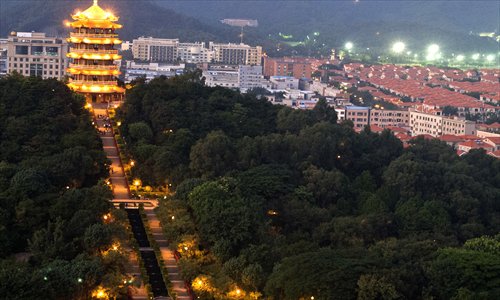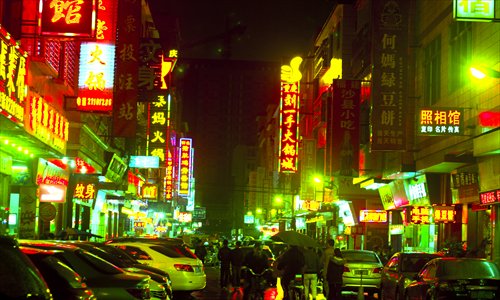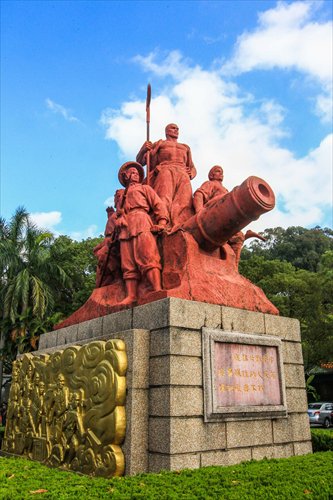HOME >> LIFE
Exploring China’s former ‘Capital of Sex’
By Tiara Lin Source:Global Times Published: 2016/5/13 0:14:53

Night view of the industrial district in Dongguan Photo: CFP

Night view of a food street in Dongguan Photo: CFP
Dongguan, a cosmopolitan city located at the heart of south China's Pearl River Delta, is actually not famous for tourism. As a former "world factory," it attracts many foreigners to come here for business.Dongguan is also well known for another reason, which has earned it the nickname "the Eastern Amsterdam."
According to the Telegraph, some 10 percent of the city's more than 8 million population is said to work in the world's oldest profession. It is hard to verify this number, as unlike The Netherlands, prostitution is illegal in China. Nevertheless, the Chinese people don't call it the "Capital of Sex" for nothing.
So, why go now? First of all, you will witness a society in transition. Do you know one of every six smart phones in the world is made in Dongguan? Currently, China is trying to move on from low-end manufacturing, Dongguan's specialty, to high-tech manufacturing and the service sector.
Moreover, there is always something interesting to do and see in Dongguan, and never is the city more alive, colorful and fun than in the summer.
City of sin
Xiaojie, prostitute in Chinese. Two short syllables, one big problem. Many wives might feel anxious when they find out their husbands are heading on a business trip to Dongguan.
The prostitution business blossomed in Dongguan along with the city's manufacturing industry. As millions of rural men swarmed into China's southern cities for work and thousands of businessmen visited the city for trade, it created huge demand. It is estimated that at its peak there were more than 250,000 sex workers and the industry generated about 50 billion yuan ($7 billion) a year, according to media reports.
Considering prostitution is illegal, brothels are often disguised as hair salons or karaoke bars. They are just as convenient as Starbucks as they can even be found in residential areas.
The first time I visited Dongguan was with my Japanese boss. We stayed at a four-star hotel. My boss asked me to order massage service for him in his room. "Just normal massage," he emphasized. So I called the reception and ordered a massage. Like my boss I made sure to emphasize that we wanted "just a normal massage."
Twenty minutes later, my boss called me, saying the massage lady still wanted to provide him "extra service" for an extra few hundred yuan. I guess nothing is really "normal" there.
In 2014, Dongguan police launched an anti-prostitution campaign. More than 1,000 entertainment venues were closed; dozens of local officials were suspended for turning a blind eye and hundreds of sex workers were arrested. It was estimated that at least 70 percent of the city's sex workers fled, turning the Dongguan into a ghost town.
When I revisited Dongguan recently, I asked a taxi driver how things are now.
"They all reopened after the crackdown," he said. "But now the city's new campaign is to make Dongguan 'the most reassuring city for wives,'" he added.
Another "normal" thing, due to the gender imbalance in the city, men in Dongguan usually have three girlfriends, according to a report from the Independent. One Dongguanese guy told the reporter that it would be considered "embarrassing" to have just one girlfriend in the city. Maybe the city's next campaign should be to make Dongguang "the most reassuring city for girlfriends."
Opium War history

A sculpture at the Opium Wars Museum Photo: IC

The Humen Weiyuan gun emplacement in Dongguan Photo: IC
Dongguan's history is not just "sexy," it is also "bloody." If you are interested in modern Chinese history, you should visit Dongguan's Humen Town, the place where the Opium Wars (1840-42 and 1856-60) broke out. The battlefield has been well preserved and turned into the Opium Wars Museum.For people like me who do not know much about the Opium War, this museum is a good place to start. To make a long history short, when foreigners were pouring opium into China, many Chinese people got addicted to the drug. When the Chinese emperor ordered that the opium trade be stopped, the British responded with war, which later led to Hong Kong being turned over to the British.
In case you are bored by history, you can go shopping! Known as the "factory of Hong Kong," Humen is a township famous for its garment industry. The more than 1,000 garment enterprises here are sure to keep you busy.
Foot massage
After walking the entire afternoon, the first thing I did after getting back to the hotel was to get a foot massage. Foot massage is very common and popular in South China. I missed it quite a lot while living abroad.
In traditional Chinese medicine, foot massage is said to be good for promoting good health. In Chinese philosophy, feet are a map to your body. By pressing certain spots on your feet, it can help stimulate certain parts of your body and help you relax.
I was kind of relieved when I saw the massage therapist was a middle-aged woman, which meant she was not going to try and provide any "extra service." She gently put my feet into warm water mixed with Chinese herbs. After about 10 minutes of soaking, she began rubbing my feet with massage oil.
I need to warn you though. Unlike Western style massages, which can be quite relaxing, Chinese-style massage can be very intense and painful. When the therapist pressed on my pressure points it hurt so much I almost cried. "No pain, no gain" was her reply.
Former manufacturing hub
Although the massage was painful, I did feel relaxed the next morning. I headed to the city's busy industrial township of Houjie, 30 minutes away from the city center, to meet up with my former boss Antony. I worked as a translator at Antony's trade company while I was at university. Every summer, I went to Houjie to accompany his foreign business partners to the Furniture Fair.
Ten years have passed and Houjie looks different than I remembered. When the global financial crisis hit in 2008, over 60 percent of small and medium-sized companies in Houjie closed. For decades, this manufacturing hub had remained a powerful economic engine, producing furniture and shoes. At present, as the country shifts from low-end industry to high-tech manufacturing, the economy and the pool of labor in Houjie have been shrinking. The factories I used to visit have been relocated, people I used to work with are gone and Antony's company has been losing orders from abroad.
Cantonese cuisine
"The only thing that probably remains the same is probably our delicious food," Antony said.
Speaking of Cantonese food, if you avoid street food you will miss out a lot of Cantonese food culture. If you happen to pass a night market, try the spicy oysters, Cantonese style barbecued pork and five-spice flavored goose. Believe me, you won't stop eating.
Unlike foods in other regions in China, Cantonese cuisine values freshness. Steaming is one of the most popular cooking methods in Guangdong Province as Cantonese people believe it is the least intrusive and healthiest cooking technique. When it comes to seasoning, oyster sauce is a must in every Cantonese kitchen. My father uses it to cook all kinds of vegetables.
Paradise of nightlife
Maybe Dongguan is no longer the "Capital of Sex" or the "world's factory," yet it is still a "paradise of nightlife" as it has many good restaurants and bars.
Later in the afternoon, my local Dongguanese friend brought me to Xiabafang in Bato Village, a wonderful ancient town in Dongguan.
Dongguan's Xiabafang is like Beijing's 798 Art Zone, a place where artists, musicians and other interesting people have gathered together. But unlike the modern 798, Xiabafang is very old.
When you walked into Xiabafang, you might feel like you've traveled in time as the buildings date back to the Ming (1368-1644) and Qing (1644-1911) dynasties. However, soon you will realize you are still in the present day as you come across cafes, Western restaurants, bars and clubs.
As the sun goes down, the ancient village comes alive. Hundreds of people seem to erupt in groups to come here to have fun. Most of the bars and restaurants are open in late afternoon until early in the morning. Dongguan really never sleeps.
Rules of thumb:
To get there:
Dongguan is 50 kilomenters from Guangdong's capital city, Guangzhou. It also has a direct high speed railway to Hong Kong and Macau. Hong Kong's railway offers service from Hung Hom Station in Hong Kong to Guangzhou with a stop at Changping Township in Dongguan. You can also take a bus from Hong Kong to Dongguan. It takes about 2 hours depending on traffic.
Weather:
It is a humid subtropical climate. Summers are long, humid and hot. Highs are about 35 C. During the day, it might be too hot to go out; at night, you can't sleep without a fan or air-conditioner. Oh, did I mention the hard-working mosquitoes? They bite 24-7.
Posted in: Feature